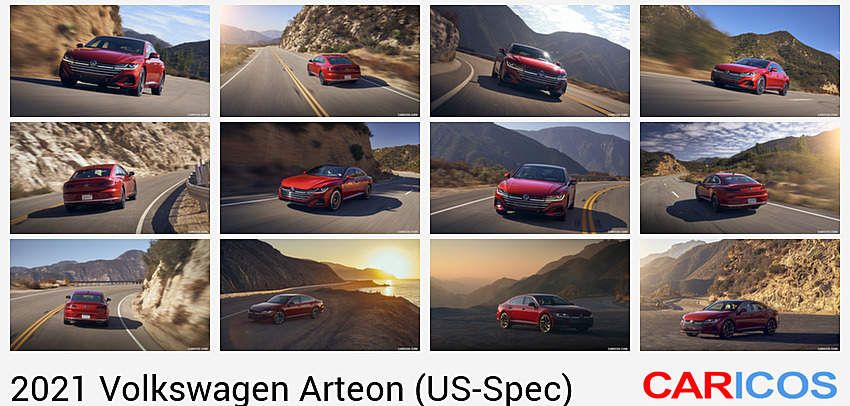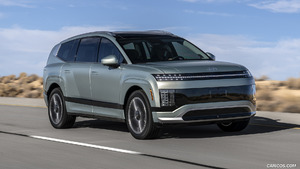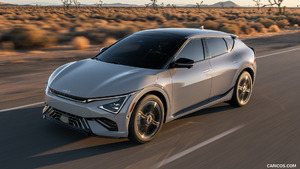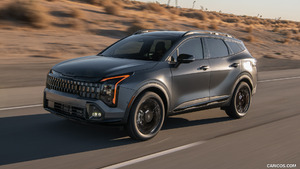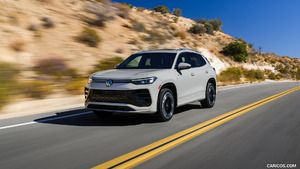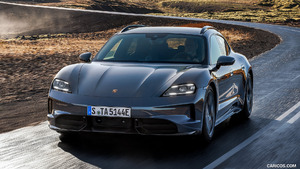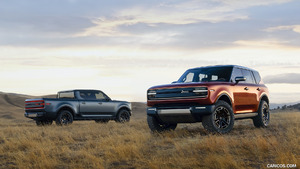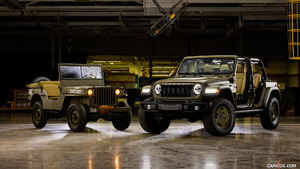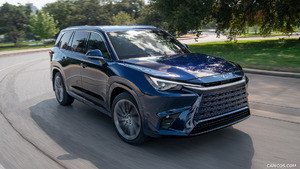2021 Arteon (US-Spec)
- Updated brand halo offers a new front end, greater levels of interior refinement, advanced connectivity and new driver assistance options
- 268hp four-cylinder TSI® engine; FWD or available Volkswagen 4Motion®
- Tech-focused standard features include: Volkswagen Digital Cockpit, Climatronic® Touch, MIB3 infotainment with wireless App-Connect, enhanced voice recognition, USB-C charging, an upgraded navigation system, Car-Net® with Wi-Fi capability, and SiriusXM® with 360L streaming and satellite content
- Available high-end features include: 19- and 20-inch wheels, massaging driver’s seat, ventilated front seats, heated rear seats, leather seating surfaces, harman/kardon® premium audio, Travel Assist, and Emergency Assist MSRP starts at $36,995
The Volkswagen Arteon is refreshed and significantly upgraded for 2021. A sharper exterior design and premium interior upgrades lead the changes, while a complement of state-of-the-art technology is newly available or now offered as standard equipment alongside hallmark Volkswagen driving dynamics.
The 2021 Volkswagen Arteon is available in three trims: SE, SEL R-Line, and SEL Premium R-Line. The refreshed Arteon features a refined front end with sharpened design elements, and a redesigned cockpit with upgraded décor and technology. Volkswagen Digital Cockpit is now standard, as is the all-new MIB3 infotainment system with updated navigation and wireless App-Connect. Updates to R-Line® models include an illuminated light bar in the front grille, and translucent décor with 30-color ambient lighting inside, as well as wireless charging, and enhanced driver assistance technology. Three new colors are added for model year 2021—Kings Red Metallic, Oryx White Pearl, and Lapiz Blue Metallic, with the latter two being exclusive to R-Line models.
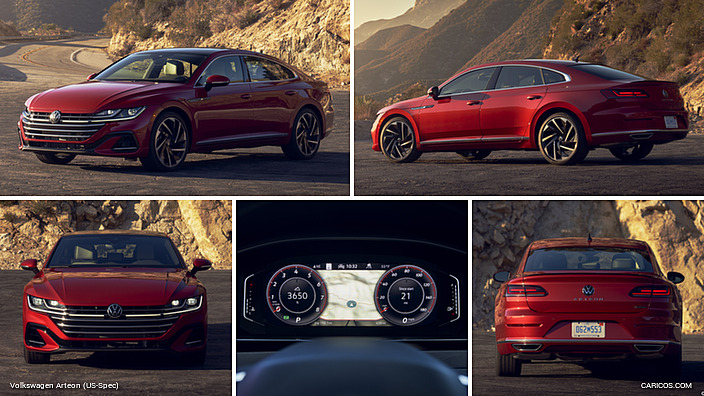 2021 Volkswagen Arteon (US-Spec)
2021 Volkswagen Arteon (US-Spec)
MSRP for the 2021 Arteon starts at $36,995 for the Arteon SE with front-wheel drive. Prices for Arteon 4Motion® all-wheel drive models starts at $43,395 for the SEL R-Line 4Motion. Destination for all Arteon models is $1,195.
Exterior
The refreshed 2021 Arteon retains its characteristic aggressive stance—low and wide—that immediately sets it apart from the sedan segment at large. Taking inspiration from classic sports cars, the contoured hood lines extend directly into the grille, while the long and wide hood stretches across the entire front profile into the wheelarches to form the shoulder section. The design is sophisticated and modern, but also effective, resulting in a drag coefficient of a mere 0.29.
The Arteon can now be optioned with an unmistakable lighting signature. For the first time, the Arteon SEL R-Line and SEL Premium R-Line feature an illuminated light bar in the grille to complement the LED headlights that are standard across the line. The light bar connects with the daytime running lights (DRLs) and surround the new Volkswagen logo, using light as the new chrome to set off the modern front end design.
Below the light bar, the four chrome bars of the previous car have been transformed into three significantly more striking chrome bars, which emphasize the width of the Arteon. Meanwhile, the lower section of the front profile has also been modified. Compared with the previous car, the SE trim now has two additional, separate air intake openings ahead of the front wheels, as well as a thin chrome line that has been integrated above the front spoiler. R-Line models feature one larger air intake below the grille that is flanked by body-colored C-shaped sections positioned ahead of the front wheels.
A strong character line runs uninterrupted around the entire car, visually pressing the body volume downward, giving it a dynamic appearance. Starting at the front grille, the stroke runs smoothly across the silhouette up to the taillight clusters. At the rear it transforms into a sharp undercut that visually reduces the height of the Arteon and carries the solid shoulder section into the decklid, where the VW badge and Arteon lettering have been redesigned.
The ambitious design is made possible by the flexible MQB chassis architecture. The wheelbase of the Arteon is 111.9 inches and is paired with short overhangs for more dynamic proportions. The Arteon is 191.6 inches long, 73.7 inches wide and 56.9 inches tall.
All Arteon models feature standard LED headlights, Daytime Running Lights (DRLs), and taillights. SEL R-Line models and above add Volkswagen’s Adaptive Front-lighting System (AFS), which adjusts the headlight beams to help compensate for dynamic changes, like deceleration and cornering, as well as High Beam Control (Light Assist). SEL R-Line models and above feature power-folding side mirrors with position memory.
The 2021 Arteon is offered with three distinct aluminum-alloy wheel designs, and R-Line trims add a number of design elements to enhance the four-door coupe’s sportiness. The SE features new 18-inch wheels, the SEL R-Line is equipped with 19-inch wheels, and SEL Premium R-Line trims have new 20-inch wheels. R-Line trims feature a unique front bumper that incorporates stylish air intakes in a gloss-black finish, R-Line air inlets, and a gloss-black rear spoiler, in addition to exterior badging.
A panoramic power-tilt-and-slide sunroof is standard equipment on SEL R-Line and SEL Premium R-Line models. Top-of-the-line SEL Premium R-Line models also feature a standard power trunk with Easy Open and Close function; drivers can simply walk up to the vehicle with their keys in a pocket or purse and kick a foot under the rear bumper to open the trunk lid, while closing the trunk only requires a touch of the button. KESSY® keyless access on all four doors and the rear hatch is now standard on all Arteon models.
Interior
The spacious interior of the Arteon receives significant updates for 2021 that further accentuate its upscale nature. Volkswagen’s interior designers have redesigned the entire dash panel—consisting of surfaces, air outlets, and trims—the center console, and the top sections of the door trims. New decorative seams at the top of the dash trim flow into upgraded top sections of the door trims, wrapping around front passengers like a cocoon. A new aluminum trim adorns the dashboard and doors in SE models; R-Line models incorporate translucent elements with 30-color ambient lighting.
The center console is revised, hosting Volkswagen’s latest MIB3 infotainment and an all-new touch-sensitive climate control system. The three-zone Climatronic® Touch automatic climate control is standard across the Arteon range. In all trims, the temperature can now be set intuitively via touch slider, as can the blower function in the manual mode. Seat heating, windshield and window defrosting functions as well as other climate functions are also controlled using new touch-sensitive surfaces in the center console.
A new generation of multifunction steering wheel also features digital touch surfaces. This leather-wrapped multifunction steering wheel is standard across all models, and is heated in SEL Premium R-Line models.
Heated, 12-way power front seats are standard in the Arteon, as are leatherette seating surfaces. R-Line models feature Nappa leather seating surfaces and driver’s seat memory settings, and SEL Premium R-Line models add ventilated front seats, heated rear outboard seats, and a massaging function for the driver.
R-Line models welcome drivers with the R-Line logo on the infotainment displays and feature a number of interior design enhancements including: contrast stitching on the steering wheel and shift knob, steering-wheel-mounted paddle shifters, black headliner, stainless-steel sport pedal covers, and stainless-steel door sills.
The long wheelbase afforded by the MQB architecture gives the Arteon generous rear legroom, at 40.2 inches, with substantial headroom as well—37.9 inches in front, and 37.1 in the rear. The Arteon offers 27.2 cubic feet of trunk storage; with the standard 60:40 rear seats folded down, that number increases to 56.2 cubic feet.
MIB3 Infotainment. All 2021 Arteon models feature innovative Volkswagen MIB3 touchscreen infotainment. The displays utilize a capacitive-touch sensor (as in smartphone and tablet technology) rather than the more common resistive touchscreens that require pressure, enabling controls like swiping and even pinch-zooming. Wireless App-Connect smartphone integration for compatible devices is standard, and offers users the ability to run select smartphone apps directly on the vehicle’s display through services such as Apple CarPlay®, Android AutoTM and MirrorLink®, and multi-phone pairing that can switch between compatible devices.
All Arteon models feature the Discover Media system with navigation and a glass-covered 8.0-inch display. The unit features enhanced voice recognition, Bluetooth technology® for compatible devices, HD radio, SiriusXM® radio (three month trial period), and two USB-C ports (one in the center console, one in the center stack; SEL Premium R-Line models add a third charge-only port in the rear console). With MIB3, Discover Media features a redesigned navigation system with simplified and enhanced map designs, intuitive route options, quick access to frequently visited locations, and advanced route management. With a Car-Net® Hotspot subscription, maps can be automatically updated with the most up-to-date traffic and construction information.
Volkswagen Digital Cockpit. The advanced Volkswagen Digital Cockpit system, standard on all Arteon models, presents drivers with a fully-digital instrument cluster. Using a 10- inch TFT display, the Volkswagen Digital Cockpit offers a configurable presentation of important vehicle information, with 21 viewing options, including car status, navigation, driving data, phone information, driver assistance features, and more. Users can select from multiple views, including a full screen navigation view.
SiriusXM. Arteon models will offer the newest and most advanced audio entertainment platform—SiriusXM with 360L. Available by subscription (three-month All Access trial package included), SiriusXM with 360L combines satellite and streaming content delivery into a single, cohesive in-vehicle entertainment experience and provides more options than before, including access to more than 10,000 hours of SiriusXM’s recorded On Demand content, and more live channels. SiriusXM with 360L’s personalized “For You” recommendations enables listeners to discover more of what they love based on listening habits and served on screen in an easy format. Additionally, individual listener profiles allow multiple drivers and passengers to customize their own favorites and receive “Related” recommendations similar to the currently playing channel and content.
harman/kardon Audio. A newly developed, high-end sound system made by audio specialists harman/kardon has been specifically geared toward the Arteon. Standard in SEL Premium R-Line trim, the system uses a 700-watt, 16-channel amplifier to power a total of twelve high-performance speakers, including a center speaker in the newly designed dash panel and a subwoofer in the trunk. The remaining treble, midrange, and bass loudspeakers are arranged in the doors. The infotainment system coordinates the individual sound control of the system, which also provides intuitive pre-configured settings, such as Pure, Chill out, Live and Energy.
Volkswagen Car-Net. Since its debut for the 2014 model year, Volkswagen Car-Net has allowed Volkswagen owners to get connected to their vehicles. Last year, Car-Net moved into the next generation of integration, with an updated mobile app, a long list of no-charge services for five years, and new subscription options. For model year 2021, Car-Net Services will be offered in three areas: Remote Access, Safe & Secure, and Hotspot. For vehicles equipped with a MIB3 system, additional online features are available with a paid subscription that provides enhanced navigation and infotainment. Early next year, Volkswagen will introduce Carrier of Choice, giving our customers the option to select a data plan from either Verizon Wireless TM or T-Mobile®. With just a few clicks in the VW Car-Net mobile app or at vw.com/carnet, owners can add their new Volkswagen vehicle to their existing mobile data plan or purchase a new one.
Car-Net Remote Access allows owners the ability to interact with their vehicle from miles away via the mobile app. It is offered at no additional charge for five years from the date of vehicle purchase. Features include remote start and stop (if equipped), remote door lock and unlock, remote honk and flash of lights, last parked location, and remote vehicle status display, which provides information on estimated fuel level and mileage and door and window status. Also available on MY21 vehicles equipped with MIB3: trips statistics and “Hello Volkswagen” in-vehicle advanced voice control, which can recognize natural language input for vehicle radio, navigation, and media functions.
VW Car-Net skills for Amazon AlexaTM are now available for most new Volkswagen vehicles, is. To set up, owners should open the skills page associated with their car model in their Alexa app and link the skill to their VW Car-Net account. This will allow them to use their voice on an Alexa-enabled device to ask Alexa to send remote commands from the comfort of their own home—for instance: “Alexa, ask Car-Net to honk my horn.”
Car-Net can make customers lives easier by locating off-street parking information and sending destinations or points of interest directly to their car from the app. Powered by ParkopediaTM, the Parking Information feature can help make owners’ lives easier by locating off-street parking information. Through the Navigate tab on the app, users can click the “P” icon to show available parking locations, either in the immediate vicinity or near a Point of Interest. Clicking on a specific location will display the address, hours of operation and pricing. Users can also send the location to their car’s navigation system, if so equipped, by clicking the “Send to My VW” button.
Vehicle Health Reports can provide owners easy access to diagnostic information. Reports generate automatically each month after enrollment and are sent directly to the email address in the owner’s profile; owners can also request updated reports anytime through the mobile app. When it’s time for scheduled service, Car-Net can not only notify the customer, but also provides a simple way to schedule a dealer visit.
Family Guardian services and Roadside Call Assist can provide added peace-of-mind no matter who is driving. Speed Alert notifies the owner when the pre-determined maximum speed limit is exceeded. Boundary Alert lets the owner know when the vehicle has traveled outside of a pre-set virtual boundary. Curfew Alert notifies the owner if the vehicle is driven while curfew alert is on. Valet Alert warns if the vehicle is driven more than 0.2 miles from the valet drop-off location. The Car-Net app allows users to control who receives notifications by designating primary and secondary users, with varying levels of control and functionality for each. Notifications can come in the form of text messages, emails, or push notifications from the mobile app itself. If the vehicle is disabled, Roadside Call Assist is available at the touch of the wrench button.
By enrolling in the DriveViewTM program, Car-Net users may be eligible for discounted rates from some of the top automotive insurance companies in the country. This program can also help Car-Net users monitor their driving by tracking activities like night driving, hard braking, idle time, and excess speed. These factors all contribute to an overall driving score, which is visible within the mobile app.
Car-Net Safe & Secure is a paid subscription service that includes Information Assistance, Emergency Assistance, Automatic Crash Notification, Anti-Theft Alert, and Stolen Vehicle Location Assistance. The subscription is $99 per year before taxes and fees, and automatically renews annually at the end of the subscription term, unless cancelled. Information Assistance—accessed through the i-call button within the vehicle—allows the driver to speak to a Car-Net agent for support needs, such as points of interest and account services. Emergency Assistance can be accessed through the SOS button in the vehicle, and, if a cellular connection can be established, puts the driver in contact with the Car-Net service center, who can direct emergency responders to the vehicle’s location and notify the user’s Emergency Contact. Provided a cellular connection can be established, Automatic Crash Notification can help automatically notify an operator who can quickly contact first responders in the event of a collision. Anti-Theft Alert sends a push notification to the user if the vehicle’s anti-theft alarm is triggered, and Stolen Vehicle Location Assistance uses Car-Net to assist law enforcement with locating the vehicle in the event that it is stolen.
Car-Net Hotspot allows passengers to access the internet with up to four connected devices simultaneously, including compatible tablets, smartphones, laptops, gaming devices, and more— at 4G LTE-enabled speed. Verizon Wireless or T-Mobile customers with an existing mobile data plan can simply add their Volkswagen vehicle as a new line item to their existing bill; non-Verizon or T-Mobile customers can set up an unlimited plan for $20/month, taxes and fees may apply.
Car-Net Hotspot also offers additional annual paid subscription packages to enhance the navigation and infotainment experience for MY21 VW owners with a factory-installed MIB3 infotainment system. With an active data plan, the Plus Nav package ($49/year) allows drivers to access online route updates, traffic reports, fuel prices, and parking information. The Plus Speech package ($9/year) offers advance voice controls using natural language, and the Plus Online Radio Package ($8/year) offers online internet radio with 30,000+ radio stations and podcasts. Media streaming apps can also be accessed at no additional charge, including iHeartRadioTM and TIDALTM (both require existing accounts).
Powertrains
The Arteon is powered by a 2.0-liter turbocharged and direct-injection TSI® engine, making 268 horsepower and 258 pound-feet of torque. The power is taken to the front wheels via a standard eight-speed automatic transmission with Tiptronic® shifting. Volkswagen’s 4Motion all-wheel drive is available SEL R-Line models and standard on SEL Premium R-Line models.
The four-cylinder gasoline unit is a member of the latest EA888 engine family, utilizing turbocharged induction and direct fuel injection to balance efficiency and power. Augmenting the EA888’s 16-valve, dual-overhead-camshaft layout is Volkswagen’s latest variable cam phasing system, which controls both intake and exhaust valves, as well as a variable lift system for the valves themselves. The single-scroll turbocharger feeds intercooled air through the aluminum-alloy crossflow cylinder head.
The cast-iron engine block uses a wall thickness of just 0.12 inches to help reduce its weight to 72 pounds, while a lightweight polymer oil pan and aluminum-alloy screws and fasteners also reduce mass. Another change that helps the engine to shed pounds is a reduction from eight to four crankshaft counterweights. Internal friction is reduced due to measures such as roller bearings for the engine’s balancer shafts and a reduction in the size of the engine’s main bearings.
The engine is also compact. The exhaust headers have been integrated directly into the cylinder head, not only optimizing the system coolant operation (aiding rapid warm-up, which helps improve efficiency), but also allowing greater thermal management of the exhaust stream.
A Start/Stop system is standard on all Arteon models. This technology stops the engine during idle when the brake pedal is held (such as when waiting at a red light) when proper conditions are met. When the brake pedal is released, the engine restarts.
Front-wheel-drive Arteon models have an 18.2 gallon fuel tank and offer an EPA-estimated fuel economy rating of 22 mpg in city driving, 32 mpg on the highway, and 25 mpg combined. Models equipped with 4Motion all-wheel drive have an 18.3 gallon fuel tank and are rated at 20 mpg in city driving, 31 mpg on the highway, and 24 mpg combined.
4Motion All-wheel-drive System. The Arteon can be equipped with Volkswagen’s 4Motion all-wheel-drive system. The latest-generation 4Motion system is designed to activate before wheelspin occurs, helping eliminate traction losses. The system achieves this by using an advanced control function based on specific driving conditions. When operating under a relatively low load or when coasting, the front wheels are driven and the rear wheels are decoupled, a feature designed to help save fuel. However, the rear wheels can be engaged in fractions of a second whenever necessary via the center differential, which is activated by an electro-hydraulic oil pump.
A control unit continually calculates the ideal drive torque for the rear wheels and controls how much the multi-plate clutch should be closed by activating the oil pump. The oil pressure increases the contact pressure at the clutch plates in proportion to the torque desired at the rear axle. So, the amount of pressure applied to the clutch plates can be used to continuously vary the amount of torque going between the front and rear wheels, up to a maximum of 50 percent at the rear axle.
In addition, the Arteon is equipped with the XDS® cross-differential lock at the front and rear. The latest XDS+ version applies this functionality to a larger range of dynamic performance, helping make the vehicle more agile. When the car is being driven at highway speeds, brake pressure is applied to the inside wheel to help restore optimal traction as soon as the electronics detect excessively light loads. The XDS+ system operates like a limited-slip differential and can help compensate for understeer during cornering. In low traction situations, the system can briefly brake a wheel that is slipping, enabling uninterrupted and stable transfer of drive power to the wheel on the opposite side.
Chassis
The chassis and running gear of the Arteon have been specifically enhanced compared to other Volkswagen MQB models, accentuating the Gran Turismo spirit of the car. A strut-type independent front suspension is mated with a four-link independent rear suspension with gas-filled dampers, and both axles are equipped with anti-roll bars. While this suspension layout is responsible for a comfortable and composed ride in many Volkswagen models, it is particularly effective in the long wheelbase of the Arteon.
From a structural standpoint, the MQB platform provides extremely high body rigidity, resulting from a combination of ultra-high-strength and ultra-high-strength hot-formed steels. Despite the large rear hatch of the Arteon, body rigidity has been increased by 10 percent as measured against a comparable notchback model. This allows for very precise steering, high vehicle responsiveness and optimal ride comfort. Ultra-high-strength steel is used in areas of the vehicle such as the side sills, as well as the side members and cross members of the body. Ultra-high-strength hot-formed steel is used for the B-pillars, center tunnel, lower bulkhead, rear side members, and roof side members.
The braking system is comprised of 13.4-inch vented front discs and 12.2-inch vented rear discs with standard three-channel ABS with electronic brake pressure distribution. The rack-and-pinion steering features electric power assist and speed-sensitive variable steering assist. This system offers a 13.6:1 steering ratio that allows for a sporty 2.76 steering wheel turns from lock to lock and a vehicle turning circle of 39 feet.
DCC®. The standard DCC adaptive damping system contributes to the balance between excellent handling and premium ride comfort by managing the suspension’s rebound and compression rates individually, helping to improve vehicle dynamics. DCC takes input signals from wheel displacement sensors and accelerometers as well as vehicle information from the Chassis-CAN bus to adaptively adjust the optimal damping force. Moreover, damping forces are selectively applied to the four wheels individually. With the new generation of DCC, it is possible to independently vary rebound and compression damping while cornering.
Driving Mode Selection. In addition to the familiar Driving Mode Selection featured programs (Comfort, Normal, Sport), the dampers on the Arteon can be adjusted across an expanded range through the individual settings submenu (Comfort+ to Sport+). Beyond the familiar Comfort setting, the driver can increase ride comfort of the Arteon even further by moving the control slider to the left into Comfort+, while a setting that is sportier than the familiar Sport setting can be set by moving the slider to the right, into Sport+. The driver can make adjustments between the Comfort, Normal and Sport profile, creating truly personalized settings.
Safety
To help protect occupants, the Arteon provides a combination of both passive and active safety systems. It features eight airbags as standard (front, side, and knee airbags for front passengers and side curtain airbags for outboard seating positions), along with a number of electronic safety systems, such as an Anti-lock Braking System (ABS) and Electronic Stability Control (ESC).
A standard feature on the 2021 Arteon is Volkswagen’s Automatic Post-Collision Braking System. This builds on the premise that a collision is rarely a single, instantaneous action, but rather a series of events that follow the initial impact—the most significant of which can cause additional collisions. The Automatic Post-Collision Braking System helps address this in certain crash scenarios by applying the brakes when a primary collision is detected by the airbag sensors, thus potentially reducing residual kinetic energy and, in turn, the chance of additional damage.
The Arteon also includes Volkswagen’s Intelligent Crash Response System, which shuts off the fuel pump, unlocks the doors, and switches on the hazard lights if the car is involved in certain types of collisions.
Finally, a reactive hood that is unique to the Arteon can raise via its hinges before impact, helping to reduce the severity of injuries in the event of a collision with a pedestrian at speeds between 15-34 mph. The triggering of the reactive hood is targeted toward helping to reduce head trauma by increasing the gap between the engine and the more flexible hood.
Driver Assistance Systems
To meet the demands of American drivers, the 2021 Arteon offers a comprehensive suite of driver assistance technology. Available features include: Forward Collision Warning and Autonomous Emergency Braking with Pedestrian Monitoring (Front Assist); Blind Spot Monitor (Side Assist) Rear Traffic Alert; Adaptive Cruise Control (ACC); Lane Keeping System (Lane Assist); Travel Assist; Emergency Assist; Park Distance Control; Parking Steering Assistant (Park Assist); Dynamic Road Sign Display; High Beam Control (Light Assist); and Overhead View Camera (Area View).
Front Assist, standard on all models, is intended to warn drivers of potential frontal collisions (Forward Collision Warning) with vehicles and pedestrians, and in some cases provide automatic braking assistance (Autonomous Emergency Braking).
Within physical system limits, Forward Collision Warning warns the driver of potential critical front-end collision situations, both acoustically and visually by a warning symbol in the instrument cluster if the car is traveling above 18 mph. Furthermore, an automatic jolt of the brakes can warn the driver of the danger. If the driver fails to brake, Autonomous Emergency Braking is activated to help slow the vehicle. If the car is traveling below 18 mph and the system detects a potential front-end collision, Autonomous Emergency Braking activates without a prior acoustic and visual warning. If the brake pedal is applied but the driver brakes too lightly, the brake pressure is increased by the system (Braking Support).
Blind Spot Monitor (Side Assist) is standard on all Arteon models. Blind Spot Monitor uses two radar sensors at the rear of the vehicle to scan the approaching traffic and is intended to warn drivers of the presence of other vehicles in adjacent lanes. If the driver uses the turn signal to indicate a lane change while a vehicle is detected in a blind spot, the system utilizes a flashing LED light in the outer area of the side mirror housing. Even if the driver does not use a turn signal, the LED light on the mirror housing will illuminate if a vehicle is detected in the blind spot. The system is designed to help alert drivers in specific situations; stationary objects or oncoming vehicles do not trigger warnings, nor do vehicles more than one lane across away from the vehicle.
If combined with Lane Assist (R-Line trims, see below) the system not only warns the driver with the flashing LED light if a vehicle is detected in the blind spot, but within system limits, it can also gently countersteer to help keep the car in the lane even if the turn signal is on. If the driver still tries to steer out of the lane, the system will warn with an additional vibration of the steering wheel.
The Rear Traffic Alert system, standard on all models is intended to detect vehicles approaching from the side that may be difficult for the driver to see while reversing. The system offers a 180-degree view of the back of the car with a range of 65 feet, and will present a visual and an acoustic warning, if a potential collision with a crossing vehicle is detected. If the driver does not react, the system can apply the brakes to help mitigate and, in the best case, can prevent a collision. The system is activated by putting the car in reverse.
Adaptive Cruise Control (ACC), available on R-Line models, uses a forward facing radar to maintain a set speed while helping maintain a set distance to the vehicle in front. The driver sets the speed and the desired spacing via buttons on the multifunction steering wheel and can further use those buttons to adjust and cancel the ACC function while the accelerator can be used to override the ACC function. Pressing the brakes always cancels the ACC function. All ACC-related system messages appear in the central multifunction display.
When the roadway ahead of the vehicle is clear, the system maintains the set speed. Arteon models fitted with ACC can match a vehicle in front and come to a stop if the vehicle in front does. If the car in front moves within three seconds, ACC will resume automatically to the set speed. If the car stands longer than three seconds, the driver can resume ACC control by pressing the accelerator pedal or the “resume” button on the steering wheel.
Lane Keeping System (Lane Assist) is available on R-Line models. When driving above 40 mph, if the system’s camera recognizes visible lane markings and, using a special algorithm, calculates that the vehicle is unintentionally straying from its lane without using a turn signal, Lane Assist actively countersteers to help keep the vehicle in the lane. If the driver takes his or her hands off the wheel for a defined period of time, the system provides an audible warning and a visual signal in the instrument cluster, asking the driver to take over.
The system will not engage if it cannot properly detect lane markings. If the turn signal has been set before crossing a lane marking, the Lane Assist system will not engage or give a warning. The driver can override the system at any time by applying minimal force to the steering wheel.
New for MY21, Travel Assist, standard on R-Line models, enables partially-automated hands-on driving from 0 to 95 mph. Travel Assist can be activated by a button on the steering wheel, and uses the Adaptive Cruise Control (ACC) and Lane Keeping Assist (Lane Assist) features to help to steer as well as accelerate and brake the vehicle in response to traffic and lane markings. This allows the driver to observe driving tasks while using minimal force on the wheel. It is the driver’s responsibility to continuously monitor the system, remain alert, and maintain control of the vehicle at all times. To ensure this, Travel Assist monitors the capacitive steering wheel to make sure the driver has their hands on it. Side Assist offers a driver-initiated lane change capability, adding another level of automation.
Also new for MY21, Emergency Assist, standard on R-Line models, can bring the vehicle to a stop if the driver is incapacitated. Emergency Assist constantly monitors the driver’s attentiveness by checking the input of their hands on the steering wheel. If the system does not detect driver input, a series of warnings (visual, audible, and brake jolts will occur. If still no input is detected, Emergency Assist will slow the vehicle to a gradual stop in its own lane. Emergency Assist constantly monitors driver input and hand placement regardless of the status of other driver-assistance systems.
Park Distance Control, equipped on R-Line models, uses sensors located in the front and rear bumpers to monitor a range of up to approximately five feet in front or behind the vehicle. The system may activate below 9 mph and helps provide guidance when parking or in tight spaces. The system has audible and visual warnings when the car starts to approach parked cars or static objects of sufficient size from the front or rear.
Maneuver Braking, a part of the Park Distance Control system, is intended to mitigate or help prevent collisions with detected static obstacles to the front and rear while the vehicle is maneuvered. The system is active between 1-6 mph. If the system detects a stationary object, it can apply the brakes automatically to help prevent or mitigate a collision. The system can be deactivated at any time using the touch display or permanently in the setup menu.
Parking Steering Assistant (Park Assist) is included on SEL Premium R-Line models, and uses four ultrasonic sensors on the front and rear of the vehicle in tandem with the Park Distance Control sensors. This system can automatically steer the car into parallel and perpendicular parking spaces (the latter both forward and in reverse). While driving below 25 mph, pressing the Park Assist button in the center console will activate the system to scan the left and right sides of the vehicle for parking spots. By using the turn signal indicator, the driver can indicate which side of the road they would like to park. When the system detects a space, “Parking Space Found” will appear in the multifunction display. The driver only needs to activate the accelerator pedal and brake once a gear is selected, as Park Assist can automatically help steer the vehicle into the parking space. The driver can override or deactivate the steering assistance at any time by turning the steering wheel, or pressing the button.
Dynamic Road Sign Display, standard on R-Line models, uses a forward-facing camera to detect and read road signs. After verifying the information with signage data stored in the onboard navigation, the system alerts the driver on the Discover Media screen in the center console, and on the Digital Cockpit instrument display.
Two final driver assistance features help provide drivers with better visibility. High Beam Control (Light Assist), standard on R-Line models, automatically switches on the headlamp high beams above 37 mph on dark or poorly lit roads, if there is no oncoming traffic detected. Below 18 mph, the high beams automatically switch off. The Overhead View Camera (Area View), standard on SEL Premium R-Line models, uses the car’s four cameras to supplement the driver’s view of what is around the vehicle.
Warranty & Maintenance
Every 2021 Arteon comes with a bumper-to-bumper New Vehicle Limited Warranty and Carefree Maintenance Program. The warranty provides coverage for four years or 50,000-miles (whichever occurs first), and can be transferred to a subsequent owner throughout the remainder of its duration. The Carefree Maintenance Program provides scheduled maintenance services for 2 years or 20,000 miles (whichever occurs first) at no additional charge, and can be transferred to a subsequent owner throughout the remainder of its duration.

